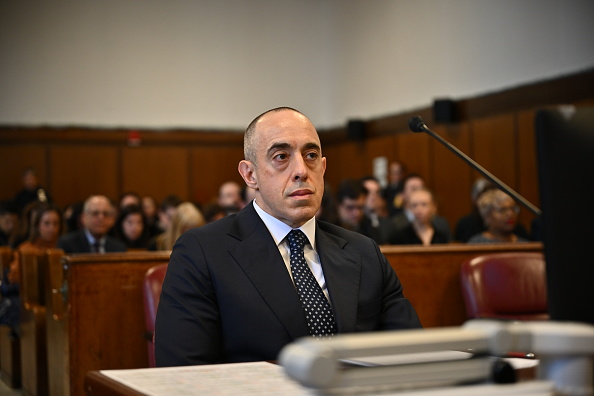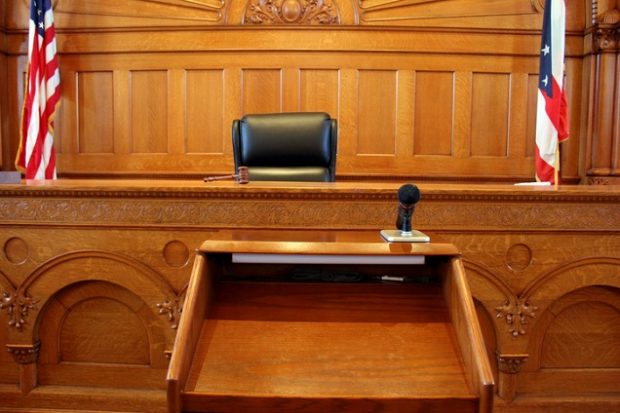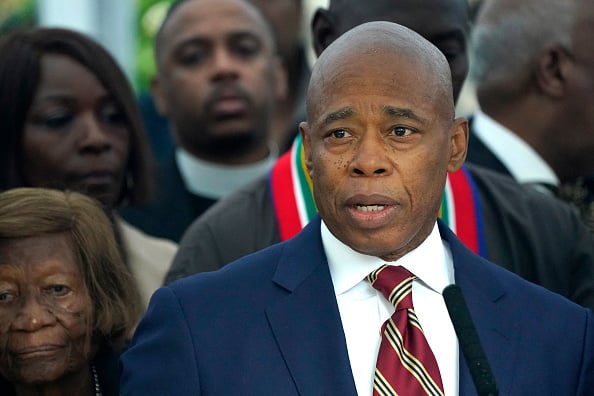
by
Angela
Weiss
–
Pool/Getty
Images)
The
Justice
Department
has
fallen,
and
we
can’t
even
blame
Elon
Musk
and
his
band
of
incel
code
bros.
This
assault
comes
thanks
to
President
Trump’s
personal
lawyer,
Emil
Bove,
the
dead-eyed
villain
currently
occupying
the
chair
of
deputy
attorney
general.
On
Monday,
Bove
directed
the
Southern
District
of
New
York
to
dismiss
the
bribery
and
corruption
charges
against
Mayor
Eric
Adams.
He
called
the
timing
of
the
prosecution
—
seven
months
before
the
primary
—
political
retribution
by
the
Biden
administration
for
Adams’s
critiques
of
his
fellow
Democrat’s
immigration
policies.
He
added
that
“the
pending
prosecution
has
unduly
restricted
Mayor
Adams’
ability
to
devote
full
attention
and
resources
to
the
illegal
immigration
and
violent
crime
that
escalated
under
the
policies
of
the
prior
Administration”
and
instructed
the
acting
US
Attorney
for
SDNY
to
dismiss
the
case
without
prejudice
so
that
it
could
be
revisited
after
the
November
election.
And
then
for
several
days
nothing
happened.
Or
at
least
nothing
happened
on
the
docket
besides
a
couple
of
sealed
filings
related
to
classified
evidence.
Then
yesterday
Danielle
Sassoon,
the
acting
USA,
resigned
rather
than
carry
out
Bove’s
order.
In
a
scathing
letter
to
Attorney
General
Pam
Bondi,
also
a
former
personal
lawyer
of
the
president,
she
described
an
explicit
quid
pro
quo
in
which
the
DOJ
agreed
to
dismiss
the
charges
in
exchange
for
Adams’s
abrogating
New
York’s
sanctuary
city
policies,
which
were
enacted
by
statute
in
2014.
This
is
clearly
an
abdication
of
both
the
rules
of
professional
conduct
and
the
Justice
Department
manual:
Federal
prosecutors
may
not
consider
a
potential
defendant’s
“political
associations,
activities,
or
beliefs.”
Id.
§
9-27.260;
see
also
Wayte
v.
United
States,
470
U.S.
598,
608
(1985)
(politically
motivated
prosecutions
violate
the
Constitution).
If
a
criminal
prosecution
cannot
be
used
to
punish
political
activity,
it
likewise
cannot
be
used
to
induce
or
coerce
such
activity.
Threatening
criminal
prosecution
even
to
gain
an
advantage
in
civil
litigation
is
considered
misconduct
for
an
attorney.
See,
e.g.,
D.C.
Bar
Ethics
Opinion
339;
ABA
Criminal
Justice
Standard
3-1.6
(“A
prosecutor
should
not
use
other
improper
considerations,
such
as
partisan
or
political
or
personal
considerations,
in
exercising
prosecutorial
discretion.”).
In
your
words,
“the
Department
of
Justice
will
not
tolerate
abuses
of
the
criminal
justice
process,
coercive
behavior,
or
other
forms
of
misconduct.”
Dismissal
of
the
indictment
for
no
other
reason
than
to
influence
Adams’s
mayoral
decision-making
would
be
all
three.
The
Times
reports
that
Adams,
who
is
represented
by
Elon
Musk’s
lawyer
Alex
Spiro
of
Quinn
Emanuel,
has
wooed
Trump
since
the
election.
And
Sassoon’s
letter
paints
a
picture
of
Bove
going
around
the
prosecution
team
and
working
to
keep
the
corrupt
bargain
secret
I
attended
a
meeting
on
January
31,
2025,
with
Mr.
Bove,
Adams’s
counsel,
and
members
of
my
office.
Adams’s
attorneys
repeatedly
urged
what
amounted
to
a
quid
pro
quo,
indicating
that
Adams
would
be
in
a
position
to
assist
with
the
Department’s
enforcement
priorities
only
if
the
indictment
were
dismissed.
Mr.
Bove
admonished
a
member
of
my
team
who
took
notes
during
that
meeting
and
directed
the
collection
of
those
notes
at
the
meeting’s
conclusion.
In
a
positively
unhinged
letter
to
Sassoon,
Bove
accused
her
of
professional
misconduct
and
insubordination.“You
lost
sight
of
the
oath
that
you
took
when
you
started
at
the
Department
of
Justice
by
suggesting
that
you
retain
discretion
to
interpret
the
Constitution
in
a
manner
inconsistent
with
the
policies
of
a
democratically
elected
President
and
a
Senate-confirmed
Attorney
General,”
he
raged,
accusing
the
prosecutor
of
“endanger[ing]
the
lives
of
millions
of
New
Yorkers”
by
refusing
to
agree
to
the
deal.“It
is
not
for
local
federal
officials
such
as
yourself,
who
lack
access
to
all
relevant
information,
to
question
these
judgments
within
the
Justice
Department’s
chain
of
command,”
he
fulminated,
adding
that
“In
no
valid
sense
do
you
uphold
the
Constitution
by
disobeying
direct
orders
implementing
the
policy
of
a
duly
elected
President,
and
anyone
romanticizing
that
behavior
does
a
disservice
to
the
nature
of
this
work
and
the
public’s
perception
of
our
efforts.”Bove
placed
Sassoon’s
deputies
on
administrative
leave
with
no
access
to
their
office
or
email,
promised
to
investigate
everyone
involved
in
this
“insubordination,”
and
removed
the
case
to
Main
Justice.The
edict
was
clear:
Prosecutions
are
a
political
tool,
and
anyone
who
objects
will
be
professionally
destroyed.But
it
would
appear
that
more
than
one
lawyer
was
willing
to
take
the
risk.
Yesterday
at
least
five
other
attorneys
resigned
rather
than
carry
out
Bove’s
order,
including
John
Keller,
the
acting
head
of
the
Public
Integrity
Section,
and
Kevin
Driscoll,
the
head
of
the
Criminal
Division.
As
of
this
writing,
there
appears
to
be
no
one
willing
to
put
their
name
on
the
Rule
48
motion.Meanwhile,
Adams
has
suddenly
decided
that
it’s
fine,
actually,
for
ICE
to
set
up
shop
at
Rikers
Island.
And
while
Spiro
immediately
released
a
statement
calling
Sassoon’s
allegations
“a
total
lie,”
his
client
was
on
Fox
with
Trump’s
official
Rage
Uncle
Tom
Homan
confirming
it.
Meanwhile,
the
Justice
Department
has
gone
from
treating
prosecutorial
independence
as
at
least
nominally
sacrosanct
to
openly
deriding
it
as
insubordination
worthy
of
termination.
W(h)ither
democracy.
United
States v. ADAMS
[Docket
via
Court
Listener]
Liz
Dye lives
in
Baltimore
where
she
produces
the
Law
and
Chaos substack and podcast.


















